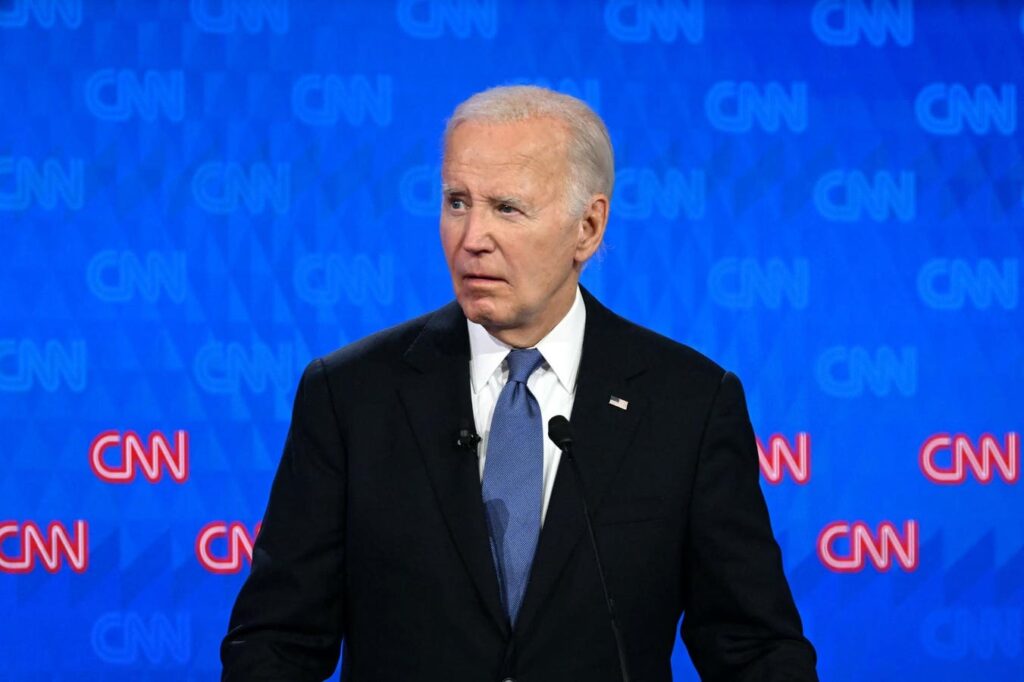U.S. President Joe Biden looks on as he participates in the first presidential debate of the 2024 elections with former U.S. President and Republican presidential candidate Donald Trump at CNN’s studios in Atlanta, Georgia, on June 27, 2024.
ANDREW CABALLERO-REYNOLDS/AFP via Getty Images
The costs of Joe Biden’s disastrous debate performance could be highest for Asia — $3 trillion high, in fact.
That’s roughly the amount of U.S. Treasury debt sitting on the balance sheets of Asia’s major central banks. Japan is most exposed with $1.2 trillion, followed by China with $770 billion. Talk that President Biden’s reelection bid is doomed has policymakers fearing the worst about vast sums of state assets.
Never mind the epic trade wars a Donald Trump 2.0 White House would unleash on a region he’s long blamed for all of America’s challenges. Dating back to his days as real estate mogul, Trump thinks Asia thrives by stealing U.S. jobs, income and wealth.
In the runup to the November 5 election, Trump is previewing 60% tariffs of all Chinese goods and revoking Beijing’s “most favored nation” trade status. He’s threatened 200% taxes on autos. He’s even talked of replacing all U.S. taxes with levies on foreign goods.
Suffice to say, most Asian leaders hoped Biden had this election sewn up. But his cognitively challenged June 27 debate with Trump was a game-changer of the highest order.
Suddenly, the specter of Trump making giant trade clashes great again appears to be the most likely scenario as polls turn against Biden.
The panic among currency reserve managers overloaded with dollars may be most acute considering Trump’s nutty plans for a second term.
Trump the businessman, remember, has been a serial bankruptcy filer since at least the early 1990s. On the campaign trail in 2016, Trump spooked Wall Street by hinting at a default on U.S. debt.
“I would borrow, knowing that if the economy crashed, you could make a deal,” Trump told CNBC when asked about his fiscal plans. “And if the economy was good, it was good. So therefore, you can’t lose.”
In April 2020, the Washington Post reported that Trump officials, looking to punish China, mulled cancelling debt held by Beijing. With the U.S. debt mushrooming toward $35 trillion, it’s not hard to understand how much of a catastrophe that would be.
Anyone who thinks such fears are ludicrous hasn’t been paying attention to Trump’s policy wish-list.
Look no further than the “Project 2025” manifesto the Heritage Foundation wrote up for Republicans. It could see Trump moving to abolish the Federal Reserve, revert back to a gold-backed currency and neuter enforcement of financial shenanigans.
Trump has talked of devaluing the dollar to gain trade advantage, Argentina-style. Efforts during his first term to shake down allies in Asia that host U.S. troops — including Japan and South Korea — will surely be a key priority in a second.
On July 1, the Supreme Court ruled that Trump, and future presidents, are effectively immune for anything they do as an “official act.” That’s carte blanche for Trump more recklessly than ever at home and abroad.
For Japanese Prime Minister Fumio Kishida, Biden’s big stumble makes this even more of a nightmarish year. At the start of 2024, the Bank of Japan seemed certain to end its 23-year-old quantitative easing regimen.
Instead, Asia’s second-biggest economy is contracting, the yen is plunging and China is slowing. Prospects are poor for widespread wage gains to hasten economic growth. And Kishida faces a real prospect of being ousted in a September election within his ruling Liberal Democratic Party.
A cratering economy, coupled with finance scandals among party members, has driven Kishida’s approval rating down to 21%. Within Kishida’s party, the specter of Trump returning would ring loud alarm bells.
The same goes for South Korean President Yoon Suk Yeol, who also spent considerable political capital cozying up to Biden’s White House. Along with huge losses on its Treasury securities, Korea’s export-reliant economy could get trumped.
That’s not to say all major leaders in Asia are sad to see Trump’s second-term odds skyrocket. North Korea’s Kim Jong Un would love to get a few more summits with Trump, perhaps in the Oval Office.
And though Xi might not relish the trade wars to come, China would welcome Trump 2.0 in other ways. Anything that alienates close U.S. allies and pushes Washington into turmoil and dysfunction would play into Beijing’s hands.
That could be true even if Trump loses. There’s a zero percent chance that Trump would concede graciously and move on, virtually ensuring another insurrection akin to January 6, 2021. When Fitch Ratings revoked Washington’s AAA status last year it cited the polarization behind that day.
All this means America’s Asian bankers may have little choice but to buckle their seatbelts and hope for the best as $3 trillion hangs in the balance.
>>> Read full article>>>
Copyright for syndicated content belongs to the linked Source : Forbes – https://www.forbes.com/sites/williampesek/2024/07/05/bidens-debate-disaster-puts-asias-3-trillion-us-debt-at-risk
